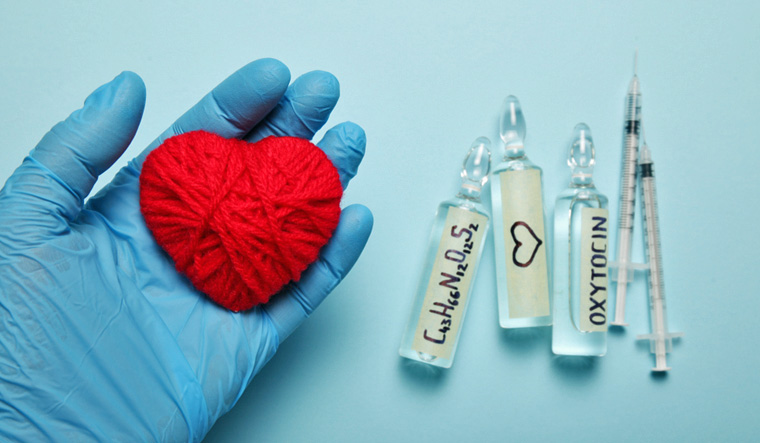On February 14, as the country celebrates Valentine's Day, the Supreme Court will—aptly so—hear a petition challenging the Delhi High Court's setting aside of the Centre's ban on oxytocin, also known as the “love hormone”. Oxytocin is often referred to as the love hormone because it is released in the body during cuddling, hugging or bonding socially. It is also the first choice of drug used to prevent death due to excessive bleeding during childbirth.
In the events following the Union health ministry's attempts to restrict its manufacture, sale, and use last year, no love has been lost between the opposing parties. While the ministry has argued that the restriction—that was supposed to come into effect last year before it was struck down by the Delhi High Court—is needed to prevent the misuse of oxytocin in the dairy industry for enhanced milk production, as activists from the All India Drug Action Network (AIDAN) and a section of doctors have pointed out that this would endanger the lives of pregnant mothers.
Oxytocin, a neurotransmitter and peptide hormone that causes uterine contractions, induces labour naturally and controls bleeding, and is listed in the government's National List of Essential Medicines, 2015, as well as the WHO's model list of essential medicines.
In December 2018, the Delhi High Court had set aside the Centre's ban on the drug based on petitions by AIDAN and two pharmaceutical companies. Earlier this month, the government approached the Supreme Court to allow it to go ahead with the restrictions.
“Oxytocin is a life saving drug used during child birth. It is the only drug available to control bleeding after delivery. The government of India has intervened to handover the production of this drug exclusively to one public sector company KAPL (Karnataka Antibiotics and Pharmaceuticals Limited). Interestingly, the company neither has the experience nor the capacity to handle such a huge responsibility,” Dr Santanu Sen, president, Indian Medical Association, said in a statement released a day before the hearing. The IMA is also intervening in the apex court to oppose the government on the issue.
Oxytocin is used to prevent postpartum haemorrhage (PPH), a complication of delivery and the most common cause of maternal deaths, accounting for 35 per cent of all maternal deaths worldwide, and 30 per cent of maternal deaths in India.
It is commonly defined as a blood loss of 500ml or more within 24 hours after birth, while severe PPH is defined as a blood loss of 1000ml or more within the same timeframe, according to the WHO.
The IMA president said that curtailing the manufacture of a life saving drug would go on to create “artificial bottlenecks and shortages”. In its statement, the influential doctors' body questioned the capacity of a single public sector company (KAPL) to manufacture and supply the drug for an entire nation. “The company itself is on record that any bulk production would take 3-4 years. This move could then jeopardise the lives of many young mothers by increasing the incidence of bleeding after child birth and subsequent morbidity and mortality,” according to the IMA statement.
For its misuse in the dairy industry, a majority of the drug is “illegally imported” from neighbouring countries, according to the IMA. However, restricting the manufacture instead of regulating the end use was illogical, they said.



